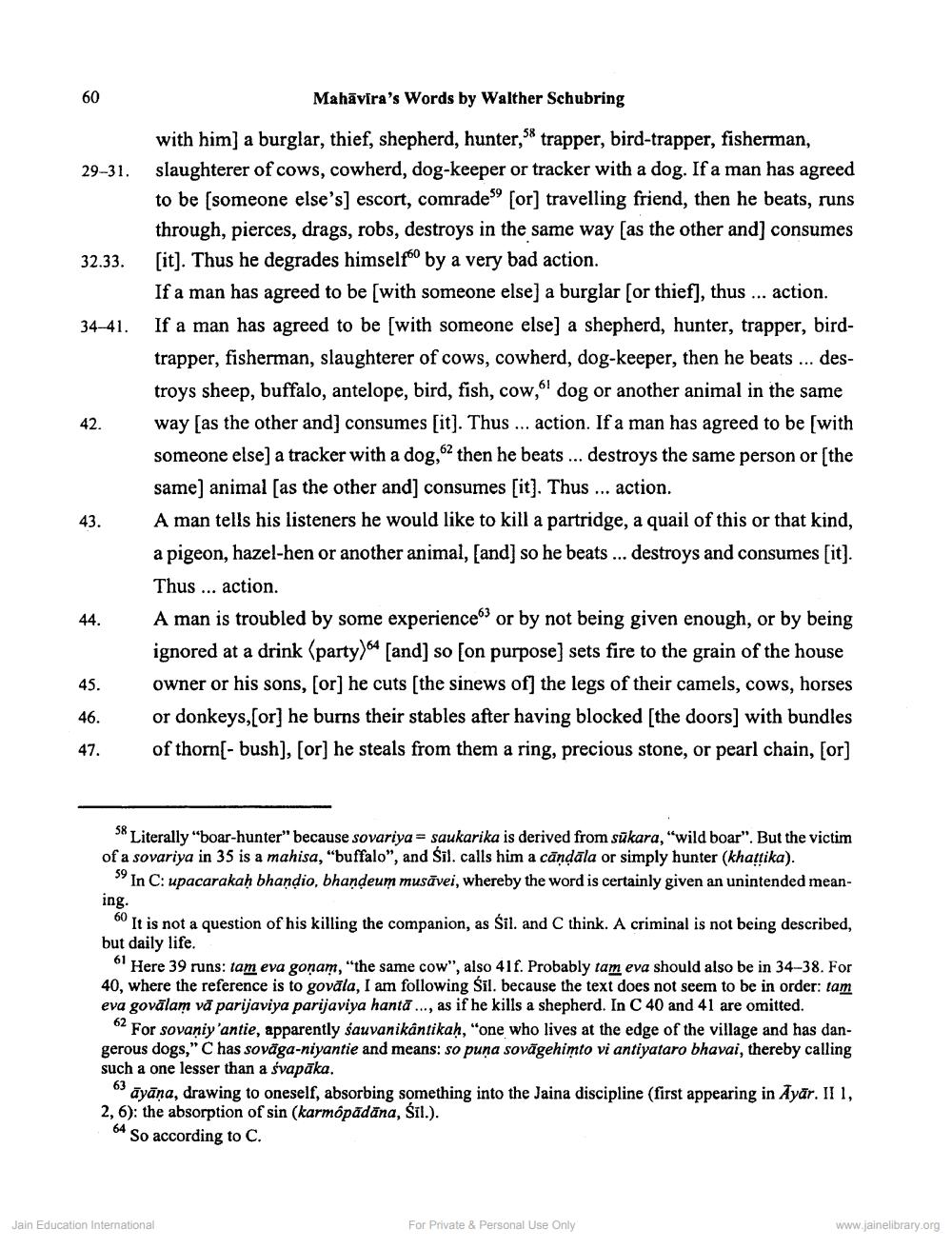________________
60
Mahāvira's Words by Walther Schubring
29-31.
32.33.
34-41.
with him) a burglar, thief, shepherd, hunter, trapper, bird-trapper, fisherman, slaughterer of cows, cowherd, dog-keeper or tracker with a dog. If a man has agreed to be someone else's] escort, comrades (or) travelling friend, then he beats, runs through, pierces, drags, robs, destroys in the same way (as the other and] consumes [it]. Thus he degrades himself by a very bad action. If a man has agreed to be with someone else] a burglar (or thief], thus ... action. If a man has agreed to be [with someone else) a shepherd, hunter, trapper, birdtrapper, fisherman, slaughterer of cows, cowherd, dog-keeper, then he beats ... destroys sheep, buffalo, antelope, bird, fish, cow, dog or another animal in the same way (as the other and] consumes [it]. Thus ... action. If a man has agreed to be (with someone else) a tracker with a dog, 62 then he beats ... destroys the same person or (the same) animal (as the other and) consumes [it]. Thus ... action. A man tells his listeners he would like to kill a partridge, a quail of this or that kind, a pigeon, hazel-hen or another animal, [and] so he beats ... destroys and consumes [it]. Thus ... action. A man is troubled by some experience63 or by not being given enough, or by being ignored at a drink (party)64 [and] so [on purpose) sets fire to the grain of the house owner or his sons, [or] he cuts (the sinews of] the legs of their camels, cows, horses or donkeys, [or] he burns their stables after having blocked (the doors) with bundles of thorn[- bush], [or] he steals from them a ring, precious stone, or pearl chain, Cor)
5* Literally "boar-hunter" because sovariya = saukarika is derived from sūkara, "wild boar". But the victim of a sovariya in 35 is a mahisa, "buffalo", and Śīl. calls him a cāņdāla or simply hunter (khattika).
In C: upacarakaḥ bhandio, bhandeum musāvei, whereby the word is certainly given an unintended meaning.
60 It is not a question of his killing the companion, as sil. and C think. A criminal is not being described, but daily life.
"Here 39 runs: tam eva gonam, the same cow", also 41f. Probably tam eva should also be in 34-38. For 40, where the reference is to govăla, I am following Sīl. because the text does not seem to be in order: tam eva govālam vā parijaviya parijaviya hantā ..., as if he kills a shepherd. In C 40 and 41 are omitted.
62 For sovaniy'antie, apparently sauvanikântikah, "one who lives at the edge of the village and has dangerous dogs," C has soväga-niyantie and means: so puna sovāgehimto vi antiyataro bhavai, thereby calling such a one lesser than a svapāka.
os āyāna, drawing to oneself, absorbing something into the Jaina discipline (first appearing in Ayar. II 1, 2, 6): the absorption of sin (karmópādāna, Sil.). 64 So according to C.
Jain Education International
For Private & Personal Use Only
www.jainelibrary.org




